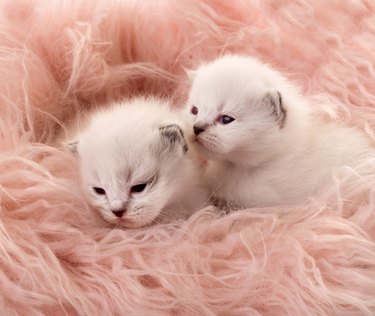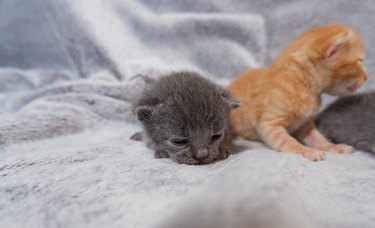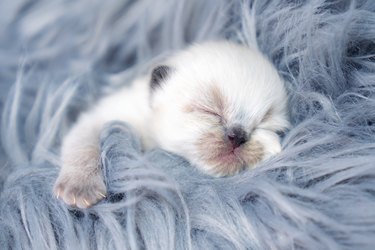If you've rescued a kitten or litter of kittens whose mother died or abandoned them, you'll have to fill that role. Newborn kittens need round-the-clock care and monitoring. Kitten care is challenging, but orphaned kittens can be successfully raised by a human caregiver.

Video of the Day
However, before attempting to fulfill the role of mother cat, take the kitten to a veterinarian for a thorough examination. Enlist medical advice when selecting a kitten milk replacer or kitten formula and creating a plan of care.
Video of the Day
Preparing your home for a newborn kitten
From the first week of age, newborn kittens cuddle up with the mother cat and their littermates to stay warm. If you have an abandoned kitten, you'll need to keep them warm. Note that kittens cannot regulate their own body temperature during the first 3 weeks of life. Avoid placing the bed in an area where the kitten will be exposed to cold drafts.
Wrap a heating pad or hot water bottle in a blanket to create a warm bed but position it so that your kitten can move away from it if they get too warm. Keep an eye on the heating pad to ensure that it's working properly and that it doesn't get too hot or malfunction. Young kittens need the additional heat source until they are 4 to 6 weeks of age.
How to feed a newborn kitten
Before hand-raising a kitten, contact local veterinarians, animal shelters, and rescue groups. They might be able to find a foster mother cat to feed the kitten. If you can't find a foster, buy a kitten milk replacer designed specifically for kittens. Don't give a kitten cow's milk, which can cause gastrointestinal upset.
Use a feeding bottle specially designed for kittens with a hole in the nipple that allows the milk to drip out easily when squeezed but is not big enough to drip out when you simply turn the bottle upside down. If too much milk comes out at once, you can drown the kitten.
Also, keep the kittens warm when you bring them out to be fed by wrapping them in a blanket or holding them near a heating pad wrapped in a towel. You should also warm the formula to room temperature. Make sure to test that it won't burn the kittens. Position the kitten on their belly as though they were nursing because trying to bottle-feed a kitten in any other position might cause them to breathe in the milk rather than swallow it.
How often do you feed a newborn kitten?
Kittens need constant feeding to stay nourished. Newborn kittens typically nurse every one to two hours with up to 10 feedings in a 24-hour time period. Do not wait longer than two hours to feed the kitten again because it's very important that they are fed at regular intervals. Falling asleep hungry can be lethal.
However, at 3 to 4 weeks old, feedings are less frequent. Kittens this age need to eat between four and six times a day. After this age, they can slowly be transitioned to cat food, preferably wet food at first.

When to wean a newborn kitten
You can start to transition your kitten away from the bottle at 3 or 4 weeks of age. Begin by offering formula in a shallow bowl that's easy for them to drink from. If the kitten isn't drinking from a dish, teach them to do so by offering your kitten a dab of formula on your finger.
Then, start the shift to an adult diet by mixing cat canned or dry food with warmed formula. During this process, continue to bottle feed as needed to ensure that the kitten is getting enough nutrition. When your kitten is around 6 or 7 weeks of age, you can switch them to a dry diet.
Elimination and potty training for a kitten
Kittens can't urinate or defecate on their own until around 2 or 3 weeks of age. Until then, their mother stimulates elimination by licking around the anus and genitals. You can simulate this action by taking a warm, moistened washcloth or a piece of gauze or cotton ball soaked in warm water and then carefully rubbing it around the kitten's genital and anal areas. Do this after every feeding.
At 4 weeks of age, you can start training your kitten to use a litter box by placing them in it after every feeding. Use a shallow box with low sides or use a cardboard box and cut one side low enough for the kitten to walk in and out easily.

Signs that something might be wrong with a kitten
Newborn kittens are very delicate and are at the most vulnerable point in their life. Kittens should sleep 90 percent of the time during their first 2 weeks of life. Much can go wrong early in life, and some signs indicating that something serious is wrong with a kitten include the following:
- Diarrhea
- Constipation
- Crying after feeding
- Aggression
- Lethargy
- Muscle twitching or convulsing
- Refusal to eat
Take young kittens to the veterinarian at the first sign of any of these issues.
When to take newborn kittens to the veterinarian
If newborn kittens are abandoned or the mother cat is not able to care for them, first take them to the veterinarian for a wellness check and to establish a feeding ritual. Keep them warm during transport. If the kitten you are caring for demonstrates any sign of distress, return to the veterinarian immediately.
Once weaned, healthy kittens should complete their vaccine program at 2 months old and will likely require deworming. Cats need veterinary checkups at least once a year. Spay or neuter surgery can be completed as early as 6 months of age.
Caring for older kittens
Kittens should be weaned off their mother's milk or kitten milk replacer by the time they are 8 weeks of age. At this point, they should begin to eat solid food, specifically wet or dry kitten food. Kittens grow very quickly during the first year of life and attain their optimal body size at about 40 weeks of age. After weaning, a young kitten's diet should focus on three key nutritional ingredients:
- Protein
- Calcium
- Fat
Don't feed kittens adult cat food until they are 1 year old. The protein content might be adequate, but other components, such as the correct level of fats and calcium, might not be correct. Note that portion feeding three to four times a day is generally recommended for kittens. Free feeding either kitten or adult cats can lead to excessive caloric intake and obesity issues later in life.
The bottom line
It is possible but challenging to raise a newborn orphaned kitten as effectively as a mother cat. Newborns need a lot of care and attention if they are to grow into healthy adults. For instance, because newborn kittens can't regulate their own body temperature for the first 3 weeks of life, they need to be kept consistently warm even when traveling to the veterinarian. Also, newborn kittens need frequent feeding with a kitten milk replacer and not cow's milk. At about 3 or 4 weeks of age, kittens begin to transition from bottle feeding to wet cat food.